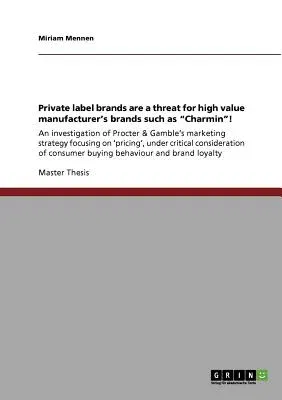Master's Thesis from the year 2007 in the subject Business economics -
Offline Marketing and Online Marketing, grade: 1.0, University of
Sunderland, language: English, abstract: This research project presents
the outcomes of a case study analysis of Procter and Gamble's operations
in the disposable paper industry, focussing on consumer buying
behaviour, branding and pricing as strategic elements in marketing. The
dynamics of the industry, as well as challenges faced by manufacturers
towards the growing threat of private label brands will be outlined.
Procter & Gamble, founded in 1837 is a global manufacturer of consumer
goods operating in more than 80 countries with over 110,000 employees.
It started its operation in Germany in1960 and is ranked third in the
disposable paper industry regarding market share. After introducing the
nature of consumer behaviour, and its linkage to Procter & Gamble's
strategic marketing activities, an extensive literature review will be
given. The research topic is put in a conceptual and theoretical context
by examining literature about the strategic, the operational dimension
relevant to this piece of work. The author defined the appropriate
methodology and research design, necessary to achieve the research
objectives of this study. Firstly, strategic marketing changes and the
dynamics of the disposable paper industry were critically analysed based
on secondary data. Secondly, the gathered primary data will be presented
and discussed in order to identify consumer buying behaviour concerning
a product's pricing and branding strategy. Thirdly, conclusions were
drawn about P & G's success or failure in the industry, supported by
Porter's five forces model. The development of the company's 'value
pricing strategy' will be outlined based on secondary data. Concluding,
it can be said that an effective marketing strategy considering high
value manufacturer's brands is crucial for achieving a sustainable
competitive pos


